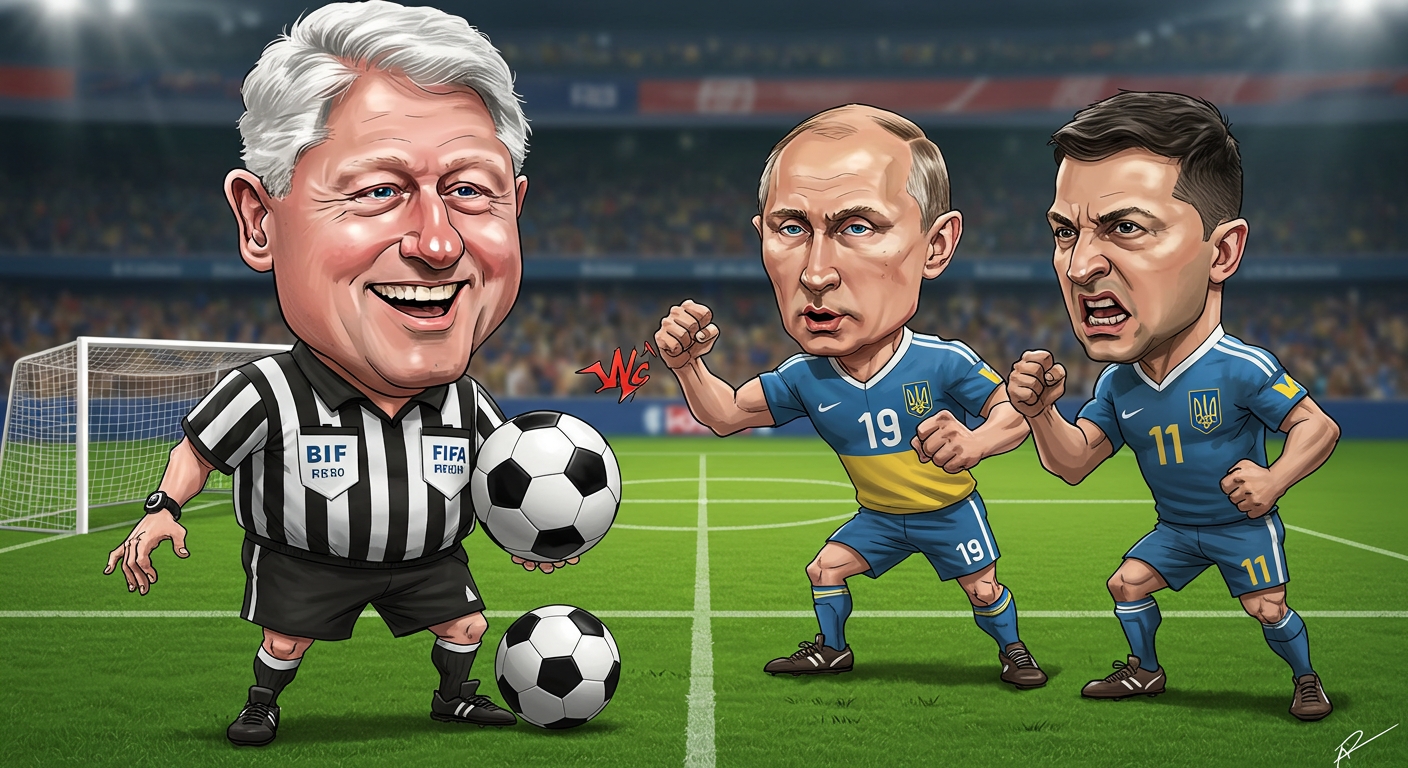
...
The article "The Clinton-era blunder that set the stage for today's Ukrainian crisis" by Rajan Menon, published on February 13, 2022, in Responsible Statecraft, argues that NATO's expansion in the 1990s was a strategic blunder that provoked Russia's actions, culminating in the 2022 invasion of Ukraine. This op-ed critically examines the article's claims, identifies factual inaccuracies, and demonstrates why these do not justify Russia's violations of international law, including the 2014 annexation of Crimea, the 2018 Kerch Strait incident, and the 2022 invasion. This analysis aims to educate readers on the historical and legal context, emphasizing Russia's breaches of the Budapest Memorandum and the broader implications for global security.
Context of the Budapest Memorandum
The Budapest Memorandum on Security Assurances, signed on December 5, 1994, was a pivotal agreement where Ukraine relinquished its nuclear arsenal—the third largest globally—in exchange for security assurances from Russia, the United States, and the United Kingdom. Russia committed to respecting Ukraine's sovereignty, territorial integrity, and refraining from the use or threat of force (Budapest Memorandum - Wikipedia). This agreement was a cornerstone of Ukraine's decision to denuclearize, tied to its accession to the Nuclear Non-Proliferation Treaty (NPT) as a non-nuclear-weapon state.
Analysis of Claims in Responsible Statecraft
Menon's article posits that NATO's expansion eastward, initiated under President Bill Clinton, was a provocative act that alienated Russia, leading to its aggressive actions, including the 2022 invasion of Ukraine. Below, we pinpoint inaccuracies and misleading claims in the article, supported by historical facts and legal perspectives.
Claim 1: NATO Expansion Was a Strategic Blunder That Provoked Russia
Article Assertion: Menon argues that Clinton's decision to expand NATO toward Russia's borders was a "misbegotten policy" that guaranteed a divided Europe and alienated Russia, implying it provoked Putin's actions.
Factual Inaccuracy: While NATO expansion was controversial, it was not a unilateral decision but a response to demands from Central and Eastern European states seeking security after Soviet dissolution. Countries like Poland, Hungary, and the Czech Republic, admitted in 1999, actively pursued membership to safeguard against potential Russian resurgence (NATO - Enlargement). The article overstates Russia's weakness in the 1990s, as Russia retained significant military capabilities and influence, evidenced by its actions in Chechnya (1994-1996) (First Chechen War - Wikipedia).
Why It Doesn't Justify Invasion: NATO's expansion did not violate any binding international agreement with Russia. Verbal assurances to Soviet leader Mikhail Gorbachev in 1990 about not expanding NATO "one inch eastward" were informal and context-specific to German reunification, not a legal commitment (National Security Archive). Russia's invasion of Ukraine in 2022, however, directly violated the Budapest Memorandum's explicit commitments to Ukraine's territorial integrity. Under international law, specifically the UN Charter (Article 2(4)), states must refrain from the use of force against another state's sovereignty, rendering Russia's actions illegal regardless of NATO's policies.
Claim 2: Russia's Objections Were Ignored Due to Its Weakness
Article Assertion: Menon claims that Russia's objections, voiced by President Boris Yeltsin, were dismissed because Russia was too weak to matter, citing a supposed betrayal of promises made to Gorbachev.
Factual Inaccuracy: The article exaggerates the dismissal of Russian concerns. The 1997 NATO-Russia Founding Act was established to address Russia's objections, emphasizing cooperative security and joint decision-making (NATO-Russia Founding Act). While Russia was economically strained, it was not powerless, as evidenced by its veto power in the UN Security Council and its role in international negotiations. The claim of a "betrayal" regarding Gorbachev's assurances lacks legal weight, as no formal treaty prohibited NATO expansion (Brookings - Gorbachev Says No).
Why It Doesn't Justify Invasion: Russia's economic challenges in the 1990s do not excuse its violations of international law. The Budapest Memorandum, a legally binding agreement, was explicitly breached by Russia's annexation of Crimea in 2014 and the 2022 invasion, both involving the use of force against Ukraine's sovereignty. The ICJ, in cases like Nicaragua v. United States (1986), has consistently upheld that geopolitical grievances do not justify military aggression, reinforcing that Russia's actions lack legal justification.
Claim 3: Putin's Concerns Are About NATO, Not Democracy
Article Assertion: Menon argues that Putin's objections to NATO expansion, not a fear of Ukrainian democracy, drive his actions, dismissing claims that Putin fears a democratic Ukraine as a Western narrative.
Factual Inaccuracy: This claim oversimplifies Putin's motives. While NATO expansion is a stated concern, Putin's actions, including the 2014 annexation and support for separatists in Donbas, align with a broader strategy to prevent Ukraine's alignment with Western institutions, including democratic reforms that could inspire Russian domestic opposition (Atlantic Council). The article ignores Russia's interference in Ukrainian elections and media to suppress democratic movements, suggesting a dual concern with both NATO and democratic governance (Washington Post).
Why It Doesn't Justify Invasion: Even if Putin's primary concern is NATO, this does not legitimize violating Ukraine's sovereignty. The UN Charter and customary international law prohibit unilateral use of force except in self-defense (Article 51), which Russia has not credibly invoked. The ICJ's advisory opinion on the Legality of the Threat or Use of Nuclear Weapons (1996) underscores that threats to sovereignty must be addressed through diplomatic or UN mechanisms, not military action.
Claim 4: NATO Expansion Caused the Russia-Georgia War and Crimea Annexation
Article Assertion: Menon suggests that the 2008 Russia-Georgia war and the 2014 Crimea annexation were responses to NATO's expansion, particularly after the 2008 Bucharest Summit's promise of membership to Georgia and Ukraine.
Factual Inaccuracy: The Russia-Georgia war was triggered by Georgia's military operation in South Ossetia, but Russia's disproportionate response and recognition of Abkhazia and South Ossetia as independent states were strategic moves to assert regional dominance, not solely a reaction to NATO (Atlantic Council). Similarly, the Crimea annexation followed Ukraine's Euromaidan protests and shift toward EU integration, not a direct NATO membership bid (BBC News). The article overemphasizes NATO as the sole driver, ignoring Russia's broader imperialist ambitions.
Why It Doesn't Justify Invasion: Russia's actions in Georgia and Crimea violated international law, including the UN Charter and, in Ukraine's case, the Budapest Memorandum. The ICJ's ruling in Georgia v. Russian Federation (2011) highlighted Russia's failure to comply with international obligations in occupied territories, reinforcing that geopolitical frustrations do not justify territorial annexation or aggression.
Timeline of Key Events
1994: Budapest Memorandum
Ukraine denuclearizes in exchange for security assurances from Russia, US, and UK (Arms Control Association).
1997: NATO-Russia Founding Act
Agreement to foster cooperation, addressing Russian concerns about NATO expansion (NATO).
1999: First Wave of NATO Expansion
Poland, Hungary, and Czech Republic join NATO, raising Russian objections (NATO).
2008: Russia-Georgia War
Russia supports separatists in Abkhazia and South Ossetia, recognizing them as independent (Wikipedia).
2008: Bucharest Summit
NATO declares Ukraine and Georgia will eventually join, prompting Russian warnings (NATO).
2014: Annexation of Crimea
Russia illegally annexes Crimea, violating the Budapest Memorandum (BBC News).
2018: Kerch Strait Incident
Russia captures Ukrainian vessels, breaching security assurances (Harvard Kennedy School).
2022: Invasion of Ukraine
Russia launches full-scale invasion, further violating international law (The Conversation).
2024: NATO Summit
NATO reaffirms Ukraine's path to membership, no timeline set (NATO).
Why Russia's Invasion Lacks Justification
Russia's violations of the Budapest Memorandum and international law are clear and indefensible. The following points summarize why NATO expansion, even if controversial, does not justify Russia's actions:
- Legal Obligations: The Budapest Memorandum explicitly bound Russia to respect Ukraine's sovereignty. The 2014 and 2022 violations breach this agreement and the UN Charter, as confirmed by UN General Assembly resolutions condemning Russia's actions (e.g., A/RES/68/262).
- Self-Determination: Ukraine's pursuit of NATO membership reflects its sovereign right to choose alliances, as upheld by the Helsinki Final Act (1975). Russia's use of force to prevent this violates international norms.
- Proportionality: Even if Russia perceived NATO as a threat, its response—annexation and invasion—far exceeds proportionate measures. The ICJ's Corfu Channel case (1949) establishes that states must seek peaceful resolutions, not military aggression.
- Historical Precedent: Russia's actions in Georgia (2008) and Moldova (Transnistria) show a pattern of undermining neighboring states' sovereignty, predating significant NATO expansion in those regions (Atlantic Council).
Conclusion
The Responsible Statecraft article presents a narrative that oversimplifies the Ukraine crisis by attributing it primarily to NATO expansion, ignoring Russia's legal obligations and broader imperialist ambitions. Russia's violations of the Budapest Memorandum and international law are unjustifiable, regardless of NATO's policies. The historical record shows Russia's pattern of aggression, from Georgia to Ukraine, driven by a desire to maintain regional dominance, not merely a response to NATO. Educating the public on these facts is crucial to countering narratives that excuse illegal actions and to promoting a rules-based international order. As of June 2025, diplomatic efforts remain essential to address the ongoing conflict and prevent further escalation.
References
- Budapest Memorandum - Wikipedia
- Ukraine, Nuclear Weapons, and Security Assurances - Arms Control Association
- Budapest Memorandum at 25 - Harvard Kennedy School
- NATO-Russia Founding Act
- NATO - Enlargement
- National Security Archive - NATO Expansion
- Brookings - Gorbachev Says No
- Atlantic Council - Putin's War Against Democracy
- Washington Post - Ukraine Disinformation
- Russo-Georgian War - Wikipedia
- BBC News - Crimea Annexation
- The Conversation - Budapest Memorandum
- NATO - Relations with Ukraine

Add new comment